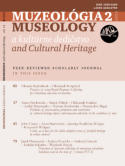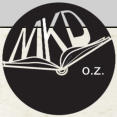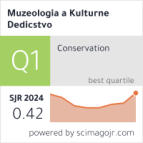

MUZEOLÓGIA
MUSEOLOGY
a kultúrne dedičstvo
and Cultural Heritage

News
Journal Muzeológia a
kultúrne dedičstvo -
Museology and Cultural
Heritage:
SJR 2024: 0,424 (Q1)
Museology SJR rank: 8/83 (Q1) Conservation SJR rank: 11/103 (Q1)JIF WoS 2023: 0,6
JCI WoS 2023: 1,28, Q1 ESCI: 49/411 (Q1)New issue
Muzeológia a kultúrne
dedičstvo 2/2025
online New volume Studia Museologica Slovaca, vol. 8 (2024) online New volume Populačné štúdie Slovenska 17 (2024) onlineNew book
P. Tišliar (ed.). Osobnosti uměleckoprůmyslového muzejnictví (2025) online
Contents 2/2023
Title: Practices of using Rapid Response Collecting by Ukrainian museums in wartime
Abstract: : Social activity and public involvement in participatory practices, and the creation of civic spaces on the basis of the
museum have become relevant for the formation of the concept of a modern museum. Such practices are especially important in
times of crisis, when history is being documented online and the Rapid Response Collecting (RRC) method is becoming widespread.
Modern war discourse requires the newest forms of archiving and description, because the recording of history is complicated by the
volatility of the military situation, the movement of large flows of displaced persons and the departure of citizens abroad. The Ukrainian
experience of documenting the war is examined in the article taking the example of the ATO Museum (an acronym for anti-terrorist
operation) in Dnipro and the online Museum of Civilian Voices. It is important for us to pay attention to the national peculiarities of the
codification of collective memory through individual experience and life stories during the full-scale military aggression against
Ukraine, and to show the newest forms of presenting the evidence of war.
Author: Hudoshnyk Oksana, Krupskyi Oleksandr
Publication order reference: Oles Honchar Dnipro National University, Faculty of Systems and Means of Mass Communication, 13,
Naykova Street, 49050 Dnipro, Ukraine, e-mail: ovgudoshnik@gmail.com, http://orcid.org/0000-0002-5941-4502; Oles Honchar
Dnipro National University, Faculty of Economics, 13, Naykova Street, 49050 Dnipro, Ukraine, e-mail: krupskyy@gmail.com,
https://orcid.org/0000-0002-1086-9274
Source: Muzeológia a kultúrne dedičstvo, year: 2023, vol.: 11, number: 2, pages: 5-16.
Key words: rapid response collecting, oral history, Russian–Ukrainian war 2022, ATO Museum, Museum of Civilian Voices
Language: English
online full-text PDF
DOI: 10.46284/mkd.2023.11.2.1
Title: Problems of preservation, protection and restoration of cultural heritage objects and museum
collections in the conditions of war
Abstract: The article is devoted to the problem of the preservation and restoration of objects of cultural heritage – monuments and
museum collections – in the conditions of war. The article’s analysis is supplemented by a brief overview of how mankind has
approached the protection of its material cultural heritage in historical times. According to data verified by UNESCO, as of November
21, 2022, 218 sites have been damaged in Ukraine since the start of the war on February 24, including 95 religious sites, 17
museums, 78 buildings of historical and/or artistic significance, 18 monuments and 10 libraries. The experience of the ongoing
Russian–Ukrainian war has once again proven the insecurity of cultural heritage sites and museums in the face of conflict. The
authors analysed the Ukrainian experience of protecting monuments, the effectiveness of these efforts, and various ways of
preserving the cultural heritage of peoples during wars. The discussion closes with conclusions on possible remedies for the
destruction of material cultural objects in Ukraine.
Authors: Pawłowska Aneta, Pabich Marek, Ivashko Oleksandr, Dmytrenko Andrii, Kozłowski Tomasz, Bigaj Przemysław
Publication order reference: University of Lodz, Institute of Art History, Poland, e-mail: aneta.pawlowska@uni.lodz.pl,
https://orcid.org/0000-0003-2847-4403; Lodz University of Technology, Institute of Architecture, Poland, e-mail:
marek.pabich@p.lodz.pl, https://orcid.org/0000-0003-2831-2826; Kyiv National University of Construction and Architecture, Ukraine, e-
mail: ghok2233@gmail.com, https://orcid.org/0000-0002-9194-2153; National University “Yuri Kondratyuk Poltava Polytechnic”,
Ukraine, e-mail: ab.Dmytrenko_AU@nupp.edu.ua, https://orcid.org/0000-0003-4757-5218; Cracow University of Technology, Faculty
of Architecture, Poland, e-mail: tkozlow @pk.edu.pl, https://orcid.org/0000-0002-4548-9490; Cracow University of Technology, Faculty
of Architecture, Chair of Architectural Design, Poland, e-mail: przemyslaw.bigaj@pk.edu.pl, https://orcid.org/0000-0003-0808-6286
Source: Muzeológia a kultúrne dedičstvo, year: 2023, vol.: 11, number: 2, pages: 17-40.
Keywords: monuments, cultural heritage, Russian–Ukrainian war, destruction
Language: English
online full-text PDF
DOI: 10.46284/mkd.2023.11.2.2
Title: Values as a base for the viable adaptive reuse of fortified heritage in urban contexts
Abstract: The last decades have brought a growing interest in fortified heritage research, protection and reuse in Europe as a result
of the demilitarisation of numerous historic defence structures occupied by armies in many countries and used as service facilities
during the Cold War. There are various approaches to the conservation of fortified heritage and adaptive reuse is one of them. The
values associated with a site should constitute the departure and arrival point for any type of intervention. An essential part of the
process therefore should be the appropriate identification of these values to base on them contemporary actions. Fortified heritage
has values similar to other forms of urban heritage but it also possesses values that are unique to this form of architecture and
landscape. This paper sets out the values that should be taken into consideration when carrying out an adaptive reuse project on
fortified heritage. Based on research and on international charters, as well as the writers’ own experience, the paper identifies seven
values and makes a distinction between two groups of values, namely: intrinsic (history, memory and identity; scientific and technical;
territorial and architectural) and extrinsic (landscape and aesthetic; environmental sustainability; social and cultural; economic). While
intrinsic values of fortified heritage are usually well described, less explored are the issues of extrinsic values. The paper presents two
case studies, Zamość Fortress and Fort St Elmo, and considers how these values were taken into account in the respective projects.
Author: Ebejer John, Staniewska Anna, Środulska-Wielgus Jadwiga, Wielgus Krzysztof
Publication order reference: University of Malta, Institute for Tourism, Travel & Culture, Msida MSD 2080, Malta, e-mail:
john.ebejer@um.edu.mt, https://orcid.org/0000-0002-2834-5057; Cracow University of Technology, Faculty of Architecture, Chair of
Landscape Architecture, ul. Warszawska 24, 31-155 Cracow, Poland, e-mail: astaniewska@pk.edu.pl, https://orcid.org/0000-0002-
4003-8025; Cracow University of Technology, Faculty of Architecture, Chair of Landscape Architecture, ul. Warszawska 24, 31-155
Cracow, Poland, e-mail: jadwiga.srodulska-wielgus@pk.edu.pl, https://orcid.org/0000-0001-7395-0662; Cracow University of
Technology, Faculty of Architecture, Chair of Landscape Architecture, ul. Warszawska 24, 31-155 Cracow, Poland, e-mail:
krzysztof.wielgus@pk.edu.pl, krzysztof_wielgus@wp.pl, https://orcid.org/0000-0003-1663-5740
Source: Muzeológia a kultúrne dedičstvo, year: 2023, vol.: 11, number: 2, pages: 41-72.
Keywords: fortifications, fortified heritage, adaptive reuse, historical value, cultural value, landscape value
Language: English
online full-text PDF
DOI: 10.46284/mkd.2023.11.2.3
Title: Protection of museum collections in emergency situations: Solutions used in the state of
Vermont (USA)
Abstract: The article presents organisational solutions for the protection of museum collections and cultural heritage sites using the
example of the state of Vermont (USA). Also described are the solutions adopted by US nationwide agencies established to respond
to natural disasters. In addition, the article introduces the mechanisms and organisational and legal solutions for managing information
in connection with an emergency situation, taking into account the needs for protecting museum collections and objects important to
the culture and history of the residents of the state of Vermont. The article in question was prepared on the basis of expert interviews,
analysis of the literature and current laws and regulations.
Authors: Dworzecki Jacek, Nowicka Izabela, Urbanek Andrzej, Szkurłat Izabela, Horyń Wojciech
Publication order reference: AMBIS University, Military University of the Land Forces in Wroclaw, Poland, e-mail:
jacekdworzecki@o2.pl, https://orcid.org/0000-0002-9357-5713; Military University of the Land Forces in Wroclaw, Poland, e-mail:
izabela.nowicka@awl.edu.pl, https://orcid.org/0000-0001-8974-0803; Pomeranian University in Slupsk, Poland, e-mail:
andrzej.urbanek@apsl.edu.pl, https://orcid.org/0000-0003-0667-4068; Pomeranian University in Slupsk, Poland, e-mail:
izabela.szkurlat@apsl.edu.pl, https://orcid.org/0000-0001-6320-8421; Military University of the Land Forces in Wroclaw
Poland, e-mail: wojciech.horyn@awl.edu.pl, https://orcid.org/0000-0002-9887-5889
Source: Muzeológia a kultúrne dedičstvo, year: 2023, vol.: 11, number: 2, pages: 73-85.
Keywords: museum collections, protection, state of Vermont (USA), crisis situation
Language: English
online full-text PDF
DOI: 10.46284/mkd.2023.11.2.4
Articles (Abstracts)

Full-text version
DOI:10.46284/mkd.2023.11.2.0
ISSN 1339-2204
eISSN 2453-9759
EV 1/22/EPP
Vol. 11 (2023), No. Is. 2



























